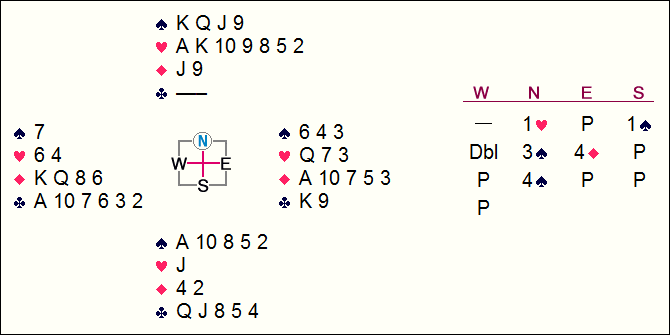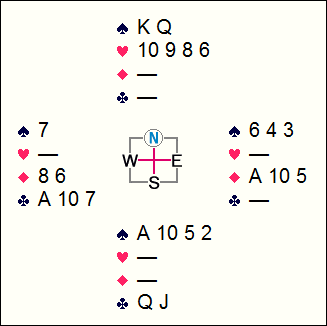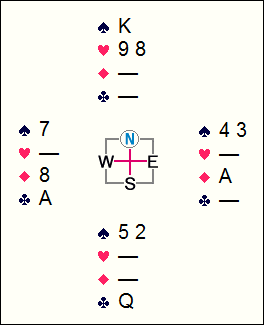

 |
 |
Smothering Oneself Is an Uncommon Method of Suicide

Sitting west in the Wednesday Morning Pairs, I led the king of diamonds.
Dummy's bidding was terrible, to say the least. With a 3-loser
hand, one needs to be sure to get to game, and 3♠ was
non-forcing. Although east's 4♦ bid was
eminently correct, had she passed, the final contract might have been just
three spades!
After cashing two diamond winners, I switched to a low club. Declarer
ruffed in dummy, then played off the ace and king of hearts. Another heart
was led; when east followed with the queen, south trumped with the
eight-spot.
Now it would have been easy enough simply to draw three rounds of trumps ending in dummy, then run the hearts, making five with a winner to spare. Our declarer, however, having other plans, ruffed another club to this position:

As the cards lay, it still was possible to score eleven tricks with any lead from dummy. For example, ruff a heart high, then play a spade to the queen. Continue with heart leads until east ruffs; then overruff with the ace, draw east's last trump with the king, and enjoy the heart winners. Of course, the success of that line would be contingent upon west's having been dealt precisely a singleton spade.
South, however, hell-bent upon a crossruff, trumped a heart with the
ten-spot and led another 'losing' club from hand, ruffing with
dummy's queen. When yet another heart was played from dummy, a magical thing
happened. Partner ruffed with the six of spades! Although
discarding the club queen would have been okay, declarer chose to overruff with
the ace of trumps, to this ending:

A trump lead at this juncture would have enabled declarer to score the
game-going trick in hand, whether the spade seven dropped or not.
Our south, however, seemed locked into her pattern. At trick eleven, she
led the club queen. Last chance! The contract still could actually be
made by discarding a heart from dummy; but no, declarer ruffed my ace with dummy's
king of spades, setting up one of the rarest and most elegant endings in the world
of card play.
With just two cards remaining, dummy led a heart, ruffed by east's four, and
declarer could not win another trick. She correctly tried the five of
trumps, but that was captured by my seven-spot. Then east proudly
claimed the setting trick with her three of spades!

Why did my partner ruff with the six-spot at trick eight?
In fact, she had been paying attention to declarer's plays in the spade
suit — namely, trumping a heart first with the eight-spot,
then another with the ten. East inferred that, had the spade seven been in the
south hand, it would have been used earlier. Placing me with that card, she judged
that ruffing with the six might be helpful. In any case, it could not cost.
The spade ten, eight, and seven being strategic equals, declarers invariably
play such holdings in top-down or bottom-up fashion. When the first heart
was ruffed with the eight-spot, east could be pretty sure that her partner
held the seven of spades! Sound crazy? Is defense that easy?
It shouldn't be; declarers should vary their plays in these situations.
But take it from me — they don't. This is a perfect example
of Ted's Law #1, which was discussed in a previous
article:
Master Play #1 – My Favorite Hand.
Our hapless declarer set up what is known as a Smother Play — a special situation in which a seemingly sure trump trick can be squelched. In general, exotic endplays such as this are the stuff of textbook analysis. The setup requirements for this one are so stringent that even a skilled declarer can expect never to encounter such an opportunity in actual play.
Moreover, this coup is supposed to be perpetrated upon the defenders.
The fact that declarer did it to herself today, on offense, makes this hand so
unique that I am confident I'll never see the like of it again. It's a
Dante's Infernal All-Time Classic.
For a review of smother plays, re-read this column: